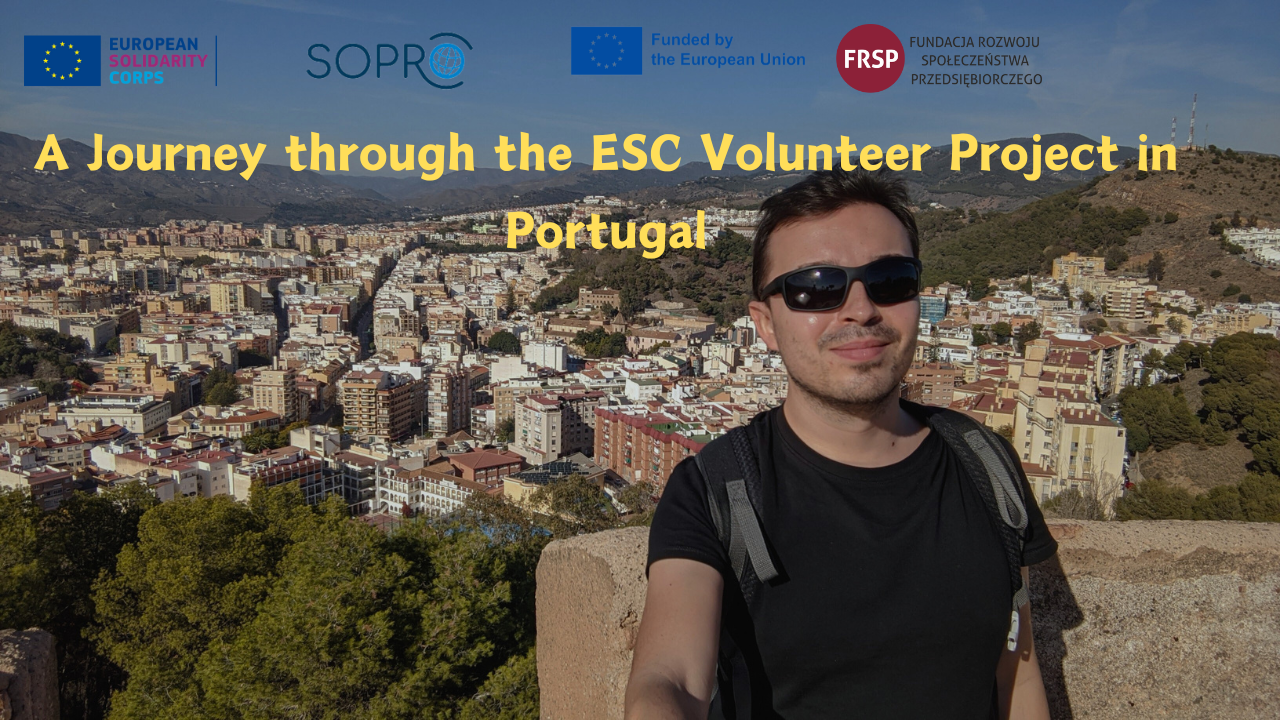How it all began?
Before I started, I was wondering should I write this article in a way that would make it look just like any other ESC-related story. In the end though, I decided to choose a different path, actually the most natural one – a perspective of 30 year old guy, who decided to leave his corporate, not-so awful job and go for a long-term volunteering on the other end of Europe.
It’s a bit unusual choice, isn’t it? But well, every uncommon decision has its relevant reasons. Simply put, I was very tired and frustrated of the last few years – a mix of post-covid factors like inflation, Ukraine-Russia war-related uncertainty, workload at my former job and also other events in my private life.
Participation required from my side quite a lot. Planning the whole thing with an immense advance, calculating savings, taking decision what to do with a place which I used to rent and moving all my belongings. The list of pre-departure actions seemed endless and fairly tight, when seeing the departure date on the 3rd of August and job contract ceasing at the end of July. I was asking myself few times in the meantime – is it worth, all of this toil?
I won’t keep you all in suspense – sure it is. Despite the initial stack of what’s required to-do, expected doubts and also some kind of fear. Not a “will I manage?” type of fear, but more like “will I fit in there?” I arrived to Barcelos on the beginning of August – a time where the temperature easily exceeds 30 degrees and number of volunteers in my receiving organisation turned out to be pretty high as well. Little wonder actually, middle of a summer is the period where a lot of short-term volunteers come, since they are students and have time for that.
SOPRO, my receiving organisation is based in Barcelos in northern Portugal, 1h train ride from Porto and 20 km from the ocean. SOPRO is engaged in a widely understood supporting local community and receives volunteers from Turkey, Italy and Poland. Volunteer’s activities take place mostly in;
1) Warehouse
It’s a place where SOPRO stores and managed donated goods for the people in need. We the volunteers visit the warehouse regularly to keep it organized. There are stored various items like second-hand furniture, home appliances, bicycles and food. Next to locals bringing old books, SOPRO receives large donations of clothes from local companies. These clothes couldn’t be sold due to manufacturing flaws or were returned unsold. During my stay we participate in seasonal actions like completing school layettes for the families who reported such a need in this action or preparing the Christmas packages. For me, visiting warehouset was a great opportunity to take a glance at local schoolbooks, regular books and other items donated. These objects allowed me to see what local people are surrounded by in their everyday life.
2) Local senior center
Elderlys who live nearby Barcelos, attend to senior center and we associate with them as an additional company – next to the senior themselves and employees. Since there is a significant language barrier (seniors speak only Portuguese, sometimes French, while the volunteers usually just English) we play with them various games, like Uno, Bingo or Boccia. We also support the staff by rearranging the space before/after the games, pass the snacks. After a few months, volunteers started to participate in a van rides – before and after the meetings. Some seniors have slight troubles with moving individually and we helped them during getting on/off the van.
3) Garden
Because SOPRO’s office is located in a house with a large garden, some activities take place here as well. During hot summer recently planted herbs and trees require watering. Sometimes volunteers paint a wooden furniture assembled by on of the seniors. Couple of times we performed also a recycling activity, based on breakup of coffee capsules (very popular in Portugal) and splitting the content into plastic remainings and coffe section, which will be used later as the fertiliser in the garden.
Afterthoughts
8 months abroad was enough to produce some afterthoughts and observations. So, why is it worth to go for a long-term ESC volunteering and what it allows to you?
1) Meet the new generation
Some say it’s difficult to talk with the people 5-7-9 years younger than yourself. But did they even try? I wonder how many of them are aware that meeting new, younger people not only will teach you something that your generation didn’t, but help to understand their perspective, habits, way of living. For instance, I never knew that you can check who displayed WhatsApp message in a group chat, or you can choose higher quality of picture sent. I simply wasn’t aware of that possibility. These people, born in the very late 90s and early 2000s, are my future workmates. You will cooperate with each other sooner or later, so knowing them better is a large benefit for me.
2) See the country from the local’s perspective
Each country has its own most popular tourism destinations. What do they have in common? They say very little about the country itself. A bunch of tourists taking selfies on Lisbon’s viewpoints or crowding on the narrow streets of Porto is not a real Portugal. What is then?
During my stay I was living in a 100k town, quite average in every aspect. Large enough to have a little university and train station and small enough to not be overwhelmed with tourists, migrants and so. The atmosphere in such a place is totally different, much more genuine – since while walking on the streets, I was surrounded just by Portuguese.
As a volunteer in SOPRO, I had a chance to see local schools, little companies or even private houses. Observing everyday life of regular people is what gives you accurate and authentic image what’s it like to live in a given country. Tourists won’t find out about many problems that affect local’s lifes – there’s no occasion or time for that.
3) Spot what you take for granted in your home country
After the first days of installing yourself in a new place, you start to notice some parts of life work in a different way, usually less convenient. Public transport between smaller towns leaves a lot to be desired. Ticket offices aren’t opened 24/7. Price list avavilable on the website is a rarity. Having no central heating in the house and perceived freezing in the winter is something obvious.
Cappuccino or ice coffee are unknown conceptions. Some food products are unavailable and shop procedures seem ridiculus. Who on earth came up with an idea of putting a label on croissant or queueing just to weigh your vegetables, rather than doing it by yourself?
However, after a while you overcome or get used to these features. The Portuguese cappuccino’s equivalent is called galão. In the winter you will get equipped with electric heater und use it just in a bedroom (since it’s pretty impossible to heat up entire house).
4) Spot what you would like to have in your home country
Contrary to the previous paragraph, Portugal has a lot of features what I enjoyed a lot. Northern Portugal as a lot to offer – varied, mountainy landscape, lush greenery thanks to a rainy winter and large share of eucalyptus. Legth of the day is far bigger than in Poland – even in the shortest days of December, the earliest sunset don’t come below 17:00. The number of sunny days in the year clearly proves that it’s southern Europe.
For me, a great advantage is Portugese cityscape – far more pleasant than a polish one. Architecture is consistent and classy, other details too. Even if the given town is quite poor and neglected, there is still some charm to it. Small villages and towns are highly enjoyable, even if they don’t contain any spectacular buildings. Inexpensive wine and seafood, delicious coffee, fresh ocean air and unhurried lifestyle are also worth mentioning – they match my taste a lot.
5) Have some me-time
Volunteering is a time when you relocate not only your body, but also your personality and habits. It turned to be a great occasion to spot what problems stem directly from me, rather my polish environment. Now some matters became more clear to me and I know where the issue is on my side. I also had a chance to take a closer look at the social life I left in Poland. Who do I write with almost every day? Who was and still is secodary in my life or in some cases, was labeled with “thankfully I don’t have a possibility to see you often right now”?
That involved my free time in Portugal as well – some people that I met or ways of spending time brought me joy and some didn’t. Same for the tasks – some were satisfying and developing, while the other brought just reluctance. When it comes to my free time in Portugal, after months of saving ideas for later when I was working full time, some of them I could finally bring into existence. To sum it all up, it’s just a good time to spot who you are, what are your values, plans and ideas for yourself in the future.
Summary
If someone asked me what is ESC experience, I would call it a general life enhancement. It apllies not only to language skills – I improved my spoken English a lot and there’s no doubt about that. Experience like this is kind of a proof that a huge change in your life is possible. And that left me with a warm feeling that if I come up with similar idea in the future – like moving to another country – I can manage that. It’s hard not to acknowledge that just being in another country is a great opportunity to train your brain. Everytime when you need a piece of information or things turn out to be working differently, there’s a lot of research, deducting, assuming and verifying. Since I did it once, I can repeat that in the future more easily, having that experience already.
Volunteering is a huge perspective widener too. On the one hand, it shows you that other countries are inhabitated by people, not aliens. They educate, work, commute and do shopping like anywhere else. On the other hand, during this time you can observe all these little differences that makes a given country unique. Some of these features may seem strange, some other you might find attractive and want to experience them again. These 8 months was my first time in Portugal and Iberian peninsula too. And now, when I write these words in Cracow, it’s a middle of April, with 12 degrees outside and steel-grey sky. I clearly don’t want these months to be the one-off in this part of Europe.
Daniel Kwiecień

